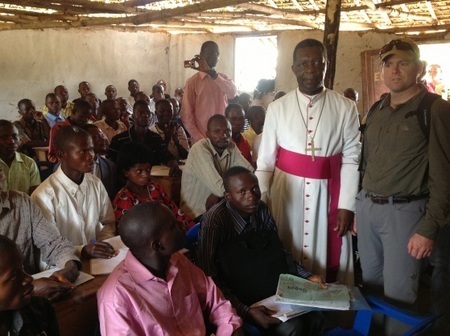The Notre Dame Initiative for Global Development (NDIGD) is taking the lead to empower disconnected communities in the Democratic Republic of the Congo by harnessing solar energy to generate electricity.
Tshumbe is a city of almost 700,000 people in remote central Democratic Republic of the Congo. The Université de Notre Dame de Tshumbe consists of several simple buildings used as lecture rooms and offices for about 250 students. It offers an abbreviated, but highly relevant, menu of educational programs: computer science, management and economics, psychology and educational sciences, and medicine.
A lack of a reliable energy sources to power computers and even reading lamps for after dark present a tremendous obstacle to student achievement. It is, moreover, not simply the lack of reliable energy that hinders The Université de Notre Dame de Tshumbe’s students, but also the incredible cost of that energy when it is available. All of their electricity now comes from a diesel generator. Due to the challenging logistics, fuel in Tshumbe can cost $16-20 per gallon, and that means electricity from the diesel costs more than $2/kWh (compared to just $0.05-0.15/kWh in the United States).
NDIGD, guided by expertise from the College of Engineering, is designing, constructing and installing a solar hybrid microgrid, complete with battery storage and diesel backup, on the grounds of the university. Electrical Engineering professor Michael Lemmon's research on optimal control schemes for microgrids offers a new model for electricity delivery for the 1.5 billion people worldwide that the electric grid does not serve.

Patrick Murphy, former managing director at the Notre Dame Center for Sustainable Energy (cSEND) and current NDIGD program director for this effort travelled to The Democratic Republic of the Congo in late 2012 to assess the site location for installation of the solar hybrid microgrid.
The system will provide 5kW of electric power for normal operations, and up to 10kW of peak power over short durations. It will do this much more efficiently than their current diesel. The system should cut fuel consumption by more than half.
The Notre Dame Initiative for Global Development, based in Notre Dame’s Office of Research, is a new multidisciplinary enterprise on the Notre Dame campus that leverages the University’s signature strengths to promote development and human dignity to people around the world who are in need. The initiative helps develop solution-oriented research focused on rigorous, data-driven impact evaluation and assessment; design and planning of development projects; and training.
“We are installing a solar microgrid at a scale that can begin to support the energy needs for The Université de Notre Dame de Tshumbe much more affordably than diesel generation can. We will also collect information to support Professor Lemmon’s research. This will not only help students and the community of Tshumbe, but also contribute to long term solutions for affordable, clean electricity in the developing world," said Murphy.
A donation from Keith (ND ‘81) and Janet Sherin with matching funds provided by General Electric, and a donation from Brad Pattelli (ND ’88) underwrite this effort. In addition, Lyman Technologies has provided hardware, design, and integration for the solar microgrid at cost. All of this generous support will allow us to have the system up and running, enabling the school to cut fuel costs and increase enrollment.
Contact: Michael Sweikar, NDIGD Managing Director msweikar@nd.edu